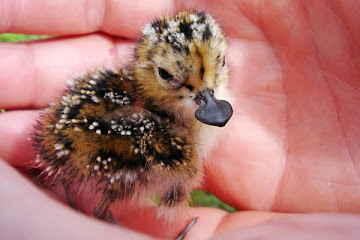English Article: Of the world's two species of orangutan, the Sumatran orangutan is considerably more endangered than its cousin in Borneo. Today there are believed to be fewer than 7,000 Sumatran orangutans in the wild, a consequence of the wildlife trade, hunting, and accelerating destruction of their native forest habitat by loggers, small-scale farmers, and agribusiness. Gunung Leuser National Park in North Sumatra is one of the last strongholds for the species, serving as a refuge among paper pulp concessions and rubber and oil palm plantations. While orangutans are relatively well protected in areas around tourist centers, those that range outside the park or live in remote areas may be killed by plantation workers.
| 
Sumatran orangutan in North Sumatra
|
Working to improve the fate of orangutans that find their way into plantations and unprotected community areas is the Orangutan Information Centre (OIC), a local NGO that collaborates with the Sumatran Orangutan Society (SOS). Founded by Panut Hadisiswoyo, OIC runs outreach and education programs to help local people better co-exist with orangutans and the park. Its "OrangUvan," a bus equipped with a library and a mobile cinema, regularly visits villages to make children and adults aware of conservation efforts and the importance of protecting forests. OIC also operates tree nurseries and replanting programs. 
OIC Mobile Unit staff in front of one of theOIC Orang-U-Vans. Courtesy of OIOIC is also working to engage the palm oil industry, a challenge since oil palm expansion is both a leading driver of deforestation and an important source of jobs in the region. While many large palm oil companies are eager to shed the perception that they are a threat to orangutans, plantation developers continue to drive destruction of important orangutan habitat, especially in unprotected areas
. Deforestation, as well as drainage of carbon-dense peatlands, is also a huge source of greenhouse gas emissions, undermining claims that palm oil is necessarily a "green" source of fuel and vegetable oil. IBut demonizing all palm oil is neither productive nor fair. Oil palm is the world’s highest yielding oilseed, generating substantially more vegetable oil per unit of land than soy, rapeseed/canola, or corn. Further, the crop has become an important source of income in much of rural Sumatra, while serving as an inexpensive foodstuff for local people and the world.
 Replanting a new generation of oil palm in a plantation in North Sumatra. Photo by Rhett A. Butler
Replanting a new generation of oil palm in a plantation in North Sumatra. Photo by Rhett A. Butler Artículo en Español:
De las dos especies de Orangutanes que existen en el Mundo, el Orangután de Sumatra es tá considerablemente más en peligro de extinción que su primo de Borneo. Hoy en día se cree que son menos de 7.000 orangutanes de Sumatra en estado salvaje, a consecuencia del comercio de especies silvestres, la caza y la destrucción de su hábitat de bosque nativo por parte de madereros, agricultores en pequeña escala, y la agroindustria.
El Parque Nacional de Gunung Leuser, en Sumatra del Norte es uno de los últimos reductos de la especie, que actúa como un refugio entre las concesiones de pasta de papel y plantaciones de caucho y aceite de palma. Mientras que los orangutanes están relativamente bien protegidas en las zonas alrededor de los centros turísticos, los que van fuera del parque o que viven en zonas remotas son muertos por los trabajadores de las plantaciones.
| 
Orangután de norte de Sumatra
|
El
Centro de Información Orangutan (OCI), una ONG local que colabora con la
Sociedad de orangután de Sumatra (SOS), y que fue creada por
Panut Hadisiswoyo, trabaja para mejorar la suerte de los orangutanes que se hayan en las áreas de la comunidad sin protección Para ello, ejecuta programas de divulgación y educación para ayudar a la población local a coexistir mejor con los orangutanes y con el parque. Su "OrangUvan", un autobús equipado con una biblioteca y un cine móvil, visita con regularidad a las aldeas para que los niños y adultos se tomen conciencia de los esfuerzos de conservación y la importancia de proteger los bosques.
La OCI también opera viveros y programas de reforestación.
| 
Personal de la Unidad Móvil de la OCI en frente de uno de los orangU-Vans. Courtesía de la OCI
|
La OCI también trabaja para comprometer a la industria de aceite de palma, un desafío ya que la expansión de aceite de palma es tanto un motor principal de la deforestación y una fuente importante de empleos en la región. La deforestación, así como el drenaje de las turberas densas de carbono, son una enorme fuente de emisiones de gases de efecto invernadero, lo que socava la afirmación de que el aceite de palma es necesariamente una fuente "verde" de combustible y aceite vegetal. Pero demonizar el aceite de palma no es ni productivo ni justo, ya que es el aceite extraído de semilla de más alto rendimiento del mundo, generando mucho más aceite vegetal por unidad de tierra que la soja, la colza / canola o maíz. Además, el cultivo se ha convertido en una importante fuente de ingresos en gran parte de Sumatra rural, y es un alimento de bajo costo para la población local y el mundo.
| 
Replantación de una nueva generación de palma aceitera en el norte de Sumatra. Foto del Rhett A. Butler
|
Algunos grupos ecologistas abogan por la prohibición de todo el aceite de palma, pero dada la creciente demanda de aceites comestibles, especialmente en China y la India, esta es una solución improbable. Otros grupos, como SOS y la OCI, centran sus esperanzas de que la Mesa Redonda sobre Aceite de Palma Sostenible (RSPO), un organismo de múltiples partes interesadas elaboren una norma de certificación que mejore el comportamiento medioambiental de la producción de aceite de palma. Este podría ser el camino a seguir, siempre que el sistema sea creíble.
Fuente/Font (1): mongabay.com








